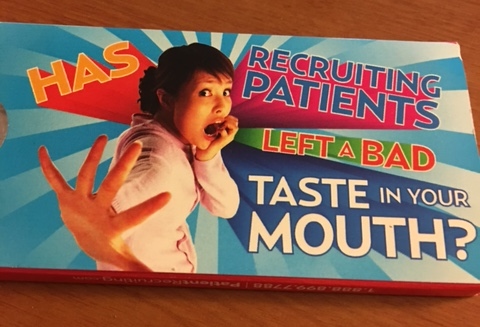Patient Recruitment for Clinical Trials: Something To Chew On
Written by |

 This chewing gum handout in the exhibit area of the recent Drug Information Association (DIA) 2016 meeting says it all from the pharmaceutical company perspective – recruiting patients for their studies is often a distasteful and difficult process. While I appreciated the gum in this package, this image left a bad taste for me as well.
This chewing gum handout in the exhibit area of the recent Drug Information Association (DIA) 2016 meeting says it all from the pharmaceutical company perspective – recruiting patients for their studies is often a distasteful and difficult process. While I appreciated the gum in this package, this image left a bad taste for me as well.
Getting people engaged in clinical trials is a challenge for almost all companies trying to complete studies and a lot of moaning goes on about patients being difficult to find, but I heard very little at the convention about why this might be or how to address the problem.
First of all, I have to acknowledge the issue of trust. For a wider variety of societal reasons, people have little trust in the process of being treated safely and fairly; that’s such a big topic with multi-factors and I will save it for another time. For now, I want to focus on what I see as a few of the other barriers for people to participate in trials. In my conversations with many of the companies present at DIA 2016, I asked the representatives what they did to overcome the barriers to participation and the standard reply was next to nothing, with many citing legal and ethical restraints.
I have participated in clinical trials and so has my husband (totally different health conditions). Both of us were informed and willing to help, but I’m not sure we would do it again unless the conditions were perfect.
Helping with the trials required us to take time off work, travel to the doctor’s offices, undergo tests and then do it again and again over a long period of time. Each time I went to the neurology office for follow-up visits, I had to take time off from my job, using my vacation time to help them advance their drug study. Each of my husband’s visits was a three-hour exam with extensive pulmonary testing. There was a small stipend given for the trials, but in no way did it cover the costs to either of us to participate. And the stipend was not paid immediately, but dispersed once or twice a year. In other words, we paid them to help with the studies.
When I talk with others about their own barriers to participating, I hear a diverse list of problems that are not being addressed in clinical trial designs: If you are working, you will have to take time off to go to these visits; if you are a person with young children, you will need to arrange childcare to cover for you while you go for the clinic visits; if you don’t have a car or can’t physically drive but still want to help in a trial, you have to find a person to take you or pay for transportation to get you back and forth from the clinic. Yet these costs to study participants are not ordinarily covered.
Our current model of studies does not allow people to be paid a salary to participate because of the well understood concern of coercion and skewing the results of the trials. It’s easy to see that paying people to be a part of a study can impact the results. However, there must be a better way to help people who want to advance medical studies so they do not incur costs from personal funds.
The big picture has a pharmaceutical company with deep pockets studying drugs that may provide profit if the results are positive. The other end of the study group is the clinic site and the investigator, who are well compensated for hosting a trial at their site — no clinic would do a study for free and the money from the pharmaceutical company comes into their revenue stream.
In the middle, between the drug companies and the clinics is the patient — that person who is seen to be difficult and leaving a bad taste.
The challenge for future recruiting is not to blame the patient participant, but to take a deep look at the barriers and then address the concerns of each person as an individual. Pay for my mileage, my childcare, my transportation. Find a way to take my information during hours that I don’t have to take off work. Talk to the person and ask what their personal barriers are to participating, and then find a way to overcome those barriers. We have enough challenges living with chronic disease. Taking on financial burdens that come with participating in clinical trials should not be added to that list.
Note: Multiple Sclerosis News Today is strictly a news and information website about the disease. It does not provide medical advice, diagnosis, or treatment. This content is not intended to be a substitute for professional medical advice, diagnosis, or treatment. Always seek the advice of your physician or other qualified health provider with any questions you may have regarding a medical condition. Never disregard professional medical advice or delay in seeking it because of something you have read on this website. The opinions expressed in this blog article are not those of Multiple Sclerosis News Today, or its parent company, Bionews Services, and are intended to spark discussion about issues pertaining to Multiple Sclerosis.



Joni
All valid points. But what about the possible adverse side affects and the medical costs associated with those? No one wants to cover the patient then. We must be treated with dignity and not as guinea pigs. Full compensation and respect should be given to anyone who volunteers in clinical trials.
Beatrice
Very true. Also, with the endless stream of DMTs with awful side effects big pharma is spewing out I can see why patients aren't too interested. If they focused on curative trials or more stem cell research they would have to turn volunteers away.
Chuck Stump
I'm NEVER interested in the next bogus "study" that immediately disqualifies me because I'm 56, white and have progressive ms. Stop all the BS studies and don't waste another penny on any "treatment" (that term makes me sick!)for thousands of dollars per month that only has a 30% chance of improving a person 30%. Funnel ALL money to HSCT or improved stem cell treatments and don't disqualify anybody (If Israel can do it, we can do it)I'm so sick of these totally BS "treatments" that are nothing but make work projects for researchers seeking government handouts/funding. I have no more patience. Time to start being heard.
Joni
There is no money in the cure.
Carol
Sadly, I believe that explains it, Joni. No cure equals healthy money stream with many 'tributaries' benefitting. Our MS contributes to the economy so to speak. Sad, but my cynicism continues to grow and flourish, along with my MS.
joni
yes, and someone gets rich. i have to say that i am happy for the number of treatments available, but stop reinventing the wheel. many of the 'new' treatments are just repackaged versions of existing ones. there are notable exceptions, admittedly.